Was It Really That Bad? Triple H’s ‘Reign of Terror’

These days, Triple H is one of the most beloved people in WWE. Many fans, especially those on the internet, have sung his praises for what he has done over the past decade or so. He took NXT and made it into a fantastic developmental brand for WWE. And thanks to his own booking, that developmental brand turned into a third brand that stands on its own against RAW and SmackDown. Triple H’s NXT has been the home of some of the best feuds and matches in WWE history. His positive contribution through this new brand has led to some fans affectionately referring to him as ‘Papa H’.
But this wasn’t always the case. There was a time, almost twenty years ago, when Triple H was hands down the most HATED wrestler in WWE, possibly even the world. People were tired of seeing him, yet he was firmly planted in RAW’s main event scene. For a period of three whole years. That period has since become known as ‘The Reign of Terror’ among some wrestling fans. And it was one of the worst periods in WWE history.
Today we look back to see if that was really well-deserved or if it was an exaggeration on the part of fans and observers at the time. Thus we ask, was it really that bad?
The charge(s)
Triple H’s time in RAW’s main event scene was one of the worst periods in RAW history. He hogged the spotlight, won way more than he should have, won when he should’ve lost, damaged many careers in how he was portrayed, and overstayed his welcome as champion by putting on many underwhelming performances and disappointing matches. This period was the reason wrestling fans started using the term ‘burial’ to describe what Triple H was doing. More and more people thought Triple H was intentionally sabotaging people’s careers and started photoshopping him to replace his trademark sledgehammer with a shovel.
The evidence
There are two key details that affect whether Triple H’s Reign of Terror really was that bad. The first is ratings for WWE’s flagship show, RAW. Dave Meltzer and his Wrestling Observer, for all his faults, has always been a thorough analyst. Each of his Observer issues has a segment dedicated to ratings and viewership trends. And in 2002, things were not good for RAW, especially when compared to the prior two years. RAW’s regular ratings dropped week after week, and eventually matched and surpassed the historic low ratings from 1997. Many people were speaking doom and gloom and said that 2002 was the worst period in RAW history (laughs in 2021).
A lot of people blamed Triple H in particular around this time, especially since he was pushed into the main event at the beginning of the calendar year and pretty much stayed there. But there was a litany of other issues that weren’t HHH’s fault that also affected those ratings. ‘Stone Cold’ Steve Austin walked out. The Rock left for Hollywood. Hulk Hogan’s star power faded quickly and he was off WWE TV before the year ended. Brock Lesnar and half the roster became SmackDown-exclusive. Scott Hall got fired due to his own personal problems. Kevin Nash was sidelined with a (surprise, surprise) quad injury. And Shawn Michaels wasn’t sure (yet) if he would be able to come back for a long career.
This left Triple H as basically the star of RAW and WWE’s creative forces scrambling to find people for him to feud with. And since it took time to build up credible challengers for him, WWE was left with no other option than to make RAW the Triple H show, hoping he could keep people entertained.
He couldn’t.
Go back and watch the RAWs from 2002 to 2005. I can guarantee that a large number of them opened with a Triple H promo, had one or more backstage segments featuring Triple H, and closed with a Triple H match or post-match angle. Seriously, he was ALL OVER Monday Night RAW. People got tired of seeing him, especially after seeing how his various challengers ended up after entering into a program with him.
The second piece of evidence we’re going to look at is how each one of his opponents ended up after working with him. What I’m going to do is list each of HHH’s title challengers/opponents in chronological order and we’ll see how their careers fared after working with him. Although those challengers’ subsequent successes/failures can’t be solely attributed to their matches with Triple H, how he wrestled against them and how he was booked against them was important in impacting their careers. This is especially true considering Triple H was involved in creative meetings on RAW throughout 2002, and his opinion carried a lot of weight at the time (due to his position as champion and as the newest member of the McMahon family).
Some people he faced more than once, so we’ll look at the directions in which their careers went after having a main-event-level feud/program with Triple H. We’ll be looking at each opponent chronologically, from WrestleMania X-8 to Badd Blood 2005 (Triple H took time off after that latter show and wouldn’t return until October 2005, at which point his time as the centerpiece of RAW was over).

Chris Jericho: Decline
Despite being the first-ever Undisputed Champion, Chris Jericho was never presented as being in Triple H’s league. In the lead-up to their WrestleMania match, Jericho played third fiddle to both Stephanie McMahon and her dog (Meltzer even sarcastically called one episode of RAW ‘RAW is dogs**t’ because Jericho – the world champion – was left to pick up after her dog because she couldn’t be bothered to do so herself). And somehow we were supposed to be excited through all of this because Chris Jericho was somehow the heel and Triple H was supposedly the conquering hero to cheer for.
Needless to say, this story did Jericho few favors, and only made the already difficult task of convincing people he was believable as World Champion even harder. Jericho himself even spoke about how few people believed in him as a World Champion, saying that Vince McMahon joked aloud about the very thought of it.
Although Jericho and HHH main-evented WrestleMania X8, no one cared by the time their match started. Everyone was exhausted from the Hogan-Rock match even though the match itself was meh, my fellow Canadians absolutely lost their minds here, as if it was IYH Canadian Stampede times a hundred.
After Jericho lost to Triple H, aside from filling the numbers in a multi-man match here or there and having a decent HIAC match with HHH at Judgment Day 2002, he was sent back down to the upper midcard, where he stayed for the next three years. Jericho also had a PPV match against John ‘the rookie’ Cena at Vengeance 2002. It wasn’t until he returned in 2007 and had that legendary feud with Shawn Michaels in 2008 that people started taking him seriously as a main-eventer again.
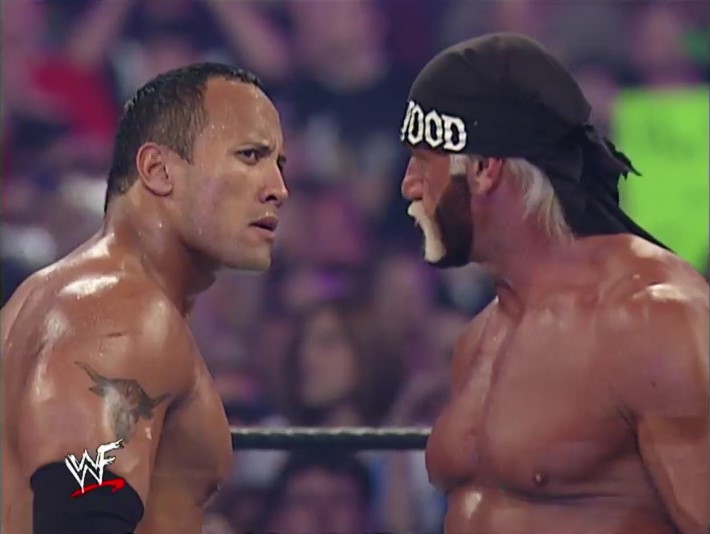
Hollywood Hogan: Decline
When Hogan returned to WWE, he was supposed to be a villain; yet after WrestleMania X8 was over, people were cheering him wildly. Fans were riding this crazy nostalgia wave and wanted to see Hogan have one last hurrah. So he faced Triple H for the WWE championship at Backlash 2002, and won.
In this particular instance, Hogan did decline but not because of anything Triple H did or didn’t do. HHH did the right thing and lost to Hogan so that WWE could capitalize on Hogan’s renewed popularity and the love the fans were giving him. But Hogan’s title reign was a Band-Aid on a severed artery. He was not the guy around whom WWE could build a brand. Hogan eventually lost the title and quickly faded from WWE completely. By year’s end, there were rumors that he was done with WWE completely, which proved that his title victory – and Triple H’s willingness to put him over – was largely for nothing.

The Undertaker: Decline
Undertaker was always at his best when he worked with smaller and more agile opponents. His best matches were against guys like Shawn Michaels, Bret Hart, CM Punk, AJ Styles, Kurt Angle, and so on. But he wasn’t wrestling such opponents during the early 2000s; he was wrestling other heavyweights, including Triple H. And unfortunately, the results weren’t good.
They had two high-profile matches against each other: one at Insurrextion 2002 and another at King of the Ring. And by God, did both of them suck. The Insurrextion match was bad for two reasons. First, despite the show having a name, it was less a PPV-quality event and more like an overrated house show (someone from Saudi Arabia must’ve been in attendance here and thought THIS was the best WWE had to offer and took it back with them). And second, Triple H beat Undertaker when Undertaker was the one challenging Hogan for the World Title at the next event. If someone can justify to me the logic behind such a decision, I’d love to see or hear it.
As for their second match, it sucked, because, well, it was Undertaker and Triple H in 2002, and both guys were beyond banged up. Triple H had bone chips in his elbow and was starting to get bigger and bigger with his bodybuilding phase. Meanwhile, Undertaker wrestled in a style that was, to be honest, boring. Lots of punches and brawling, and he had gotten much slower since his return in 2000.
These matches didn’t do either man any favors; in fact, it exposed their flaws. Undertaker needed someone to work around him and bounce off him, and Triple H wasn’t that person. This match caused Undertaker to suffer a bit of a decline that lasted the next five years. He was still more or less a main-eventer; but his match quality was subpar outside of a few matches with guys like Brock Lesnar or Kurt Angle. Triple H thought he was as good as his old buddy Shawn Michaels and that he could carry any opponent to a great match. But that theory was proven categorically false with this match, especially since both wrestlers fought in more or less the same style and lacked genuine chemistry.
And speaking of Triple H’s old buddy Shawn…
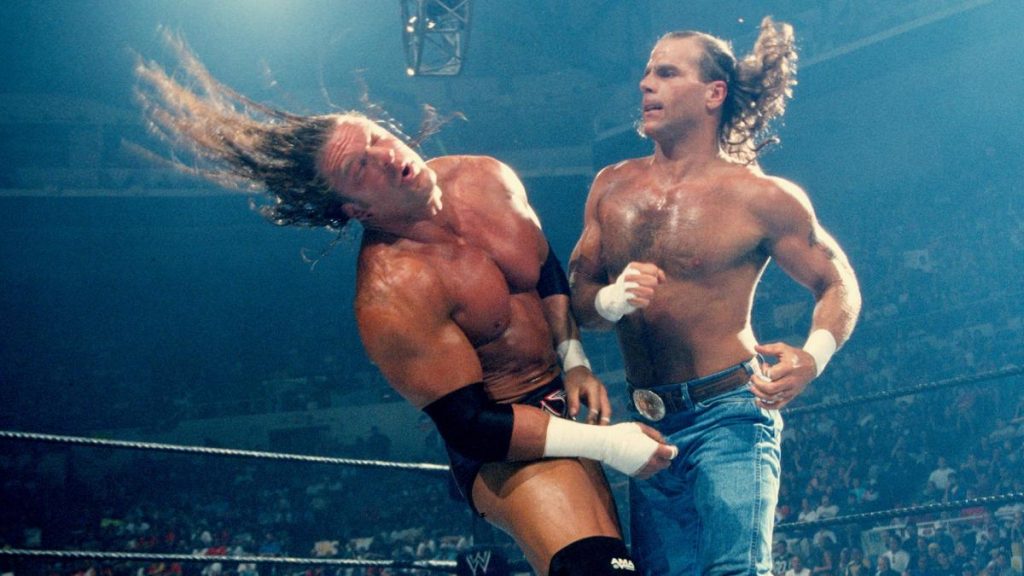
Shawn Michaels: Steep Incline
Shawn Michaels has always been Shawn Michaels. He’s on many fans’ shortlist for greatest pro wrestler of all time, especially after his second run ended up being WAY better than anyone could’ve predicted. He came back to WWE and had a great match with Triple H at SummerSlam 2002. Yet the initial mindset was that this was a one-and-done situation. However, that mindset soon disappeared as Shawn basically came back as full-time performer and went on to have an amazing eight-year run.
Shawn Michaels left his feud with Triple H relatively unscathed. He and Triple H had several great matches during this time, including at Survivor Series 2002, in late 2003 on RAW, and at WrestleMania XX. And while he didn’t win any world titles beyond winning the first Elimination Chamber, he went on to have a stellar career and proved beyond a shadow of a doubt that he was indeed ‘the showstopper’ and stole the show with his incredible in-ring talent.
But while Triple H had great matches with Michaels, those matches came at the expense of the rest of the RAW roster. When Michaels won the World Heavyweight title from Triple H, it rubbed people, both within WWE and without, the wrong way. Triple H was in the main event every week and rarely lost; only for Michaels – then seen as a part-timer with an uncertain future – to be the guy to beat HHH to win the World Title. It was obvious to most people that HHH was putting his friends ahead of the long-term success of the RAW brand, and those whom he had already beaten were upset over backstage politics messing with RAW’s on-screen product more and more. Further, there were issues with their matches going too long, sometimes at the expense of other wrestlers on the roster. That only augmented people’s suspicions that Triple H was booking himself to have more air time than anyone else. I mean, in what crazy world does a Hell in a Cell match need to go 47 minutes?
Then again, he was in the ring with Shawn Michaels, who earned praise from people for being the best in WWE history for good reason.
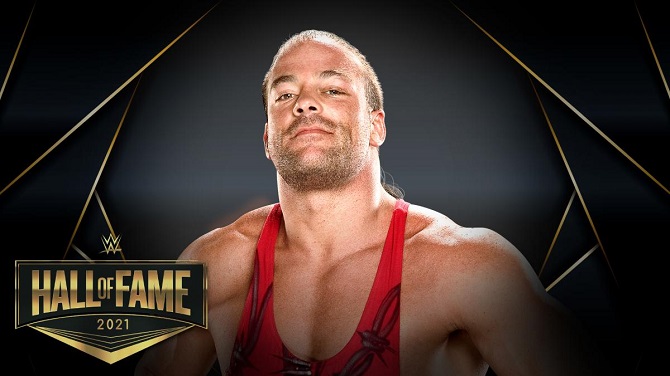
Rob Van Dam: Steep Decline
Rob Van Dam was the only WCW/ECW Alliance wrestler to survive that awful feud with his popularity relatively intact. There was something about the unorthodox RVD that really captivated people. But RVD himself wasn’t always happy in WWE, and didn’t always get along with everyone. And one of the people he really disliked was Triple H, for a bunch of different reasons.
That dislike must’ve been mutual because these two had a match at Unforgiven 2002 and it wasn’t pretty. Rob Van Dam never came across as being on HHH’s level, and the match seemed to expose that. RVD went for a dive and HHH outsmarted him by sidestepping him. A ref bump took place (shocking) and Flair turned on RVD by aligning with HHH. The match sent a clear message that RVD wasn’t believable as someone on HHH’s level, which RVD hoped to fix later on. By almost killing Triple H….literally.
Now, those of you who read my regular work know that I like to use the word ‘kill’ to emphasize the severity of some big move. I’ve seen a ton of crazy, vicious, high-risk wrestling moves that look so brutal that the wrestler landing the move might as well be committing murder. Of course, my using this language is but an exaggeration. What happened to Triple H at Survivor Series 2002 was not.
In the first-ever Elimination Chamber match, RVD executed a Frog Splash from the top of a pod onto Triple H. But RVD messed something up, and landed square on Triple H’s throat, causing his windpipe to seize up. Triple H had trouble breathing and had to be hospitalized. Pro wrestler or not, anytime someone lands on you and nearly crushes your windpipe it is a serious matter.
Now, this injury to Triple H was bad enough. But it was compounded by the fact that, since coming to WWE, RVD had been hurting other wrestlers with his maneuvers. HHH and RVD had another big singles match in December 2002 and Shawn Michaels was the special guest referee that was clearly favoring RVD. And yet, Triple H – the heel – overcame both RVD (who was trying his hardest to not hurt HHH and thus worked a more boring match) and Shawn Michaels to win once more. RVD couldn’t beat Triple H with thehelp of a biased referee. How could anyone possibly take him seriously as a challenger after this?
After this feud, RVD bounced around midcard feuds until 2006 when he won the WWE Championship. It took him three years to recover from a main-event feud with Triple H.
Kane: STEEP Decline
Somehow, WWE managed to do the impossible with Kane in his rivalry with Triple H: they managed to both humanize and demonize him at the same time. The humanization (which was completely unnecessary, by the way) came when WWE (through Triple H) revealed that Kane had a girlfriend and was driving her home from a bar one night. Hearing WWE’s resident masked monster doing these things damaged his special aura and turned him into just another guy in WWE who happened to wear a mask. And in the same feud, they managed to make Kane even more monstrous than he already was by insinuating that he had sex with a corpse.
Yes, it’s the infamous Katie Vick angle. The worst ‘wrestling segment’ of all time.
Now, plenty has been said about the specific details of this atrocious, bottom-of-the-barrel idea of a storyline. But what tends to get lost in all this is how Kane, the real Kane, reacted to being accused of necrophilia. Did he throw a fit backstage? Did he defend himself and deny HHH’s accusations? Did he maul Hunter so badly that it took a small army of referees and officials to pull them apart?
No. He wrestled a tag team match with Triple H and spent a glaring amount of time waiting on the apron. He was (supposedly) fuming over such disgusting accusations, but he was still going to follow tag team rules and wait until he could attack Triple H legally. Shenanigans ensued and Kane kidnapped HHH and threw him into the back of his car (even as the trunk’s door opened and HHH could’ve escaped at any time in a WCW-level error).
They had their match at No Mercy 2002, and it was dreadful. Kane should’ve gotten his revenge here and beat Triple H to a pulp, even if it cost him the match. Instead, the referee took a bump, Kane got distracted by Flair, and HHH Pedigree’d him to win the match (and also Kane’s Intercontinental title, but we’ll get to that later). In doing so, HHH kept his position at the top of RAW, gained more gold, and most importantly, destroyed Kane beyond all recognition.
Maybe that was his master plan; that the only way to beat Kane was to accuse him of something so vile that it would goad him into being rash and unpredictable. But that story direction never materialized. This was Triple H making awful jokes at Kane’s expense and Kane never got the revenge he should have gotten.
There was just no recovery from this angle. Kane never really got his revenge and never returned to the way he was before. Pre-Katie Vick Kane scared everyone from curtain-jerkers to main-eventers and was beloved by fans as the best monster badass since pre-WWE Vader. Post-Katie Vick Kane became a joke, and from there began a downward spiral from which he never really recovered. Kane went from being an upper midcarder that people wanted to see in big fights to a forgettable midcarder, especially after he unmasked.
If there was ever a reason to believe someone in WWE was deliberately sabotaging other wrestlers’ careers by putting them in awful stories, it was this one. Kane was destroyed beyond salvation, and his only World Title reign came about because he had been loyal and tenured, not because he was a compelling wrestler.
It just couldn’t possibly get worse than this for any of Triple H’s feuds…could it?
Scott Steiner: Steep Decline
Sadly, Steiner’s return at Survivor Series 2002 was his peak. Despite having one of the most gangster entrance themes in WWE history, Steiner failed to live up to the hype. He was put into a feud with Triple H almost immediately, and the results were absolutely horrible. Steiner’s gimmick was that he had BIG MUSCLES, and he was going to face early 2000s Triple H, a guy that also had BIG MUSCLES because he was really getting into bodybuilding. By the time this feud started, Triple H had put on so much muscle mass that he looked like his muscles would literally pop out of his skin. He was unbelievably immobile compared to how he had been before. And he went against a post-WCW Scott Steiner.
The result was arguably the WORST Triple H match ever.
(It’s funny. This is a video showing the ‘highlights’ of that match. But the word ‘highlights’ here is REALLY stretching it).
His match with Steiner at the 2003 Royal Rumble was a textbook case in disappointment. They hyped it up so much but they failed to deliver in every way. Steiner got burned out quickly and had to rely on spamming belly-to-belly suplexes to try and get anywhere. Meanwhile, Triple H worked his typical main-event-style brawl and once again won the match due to shenanigans. Worse, they had a rematch a month later at No Way Out and it was just as bad. When it was over, Steiner was exposed for being not worthy of the main-event and Triple H steamrolled through yet another guy without really proving he was as good as he claimed to be.
In the span of five months, Steiner arrived, sucked the life out of a nearly-lifeless RAW main event scene, and then disappeared to the lower card. Steiner didn’t even figure into any major plans for WrestleMania XIX a few months away.
And that was because Triple H moved on to feud with…
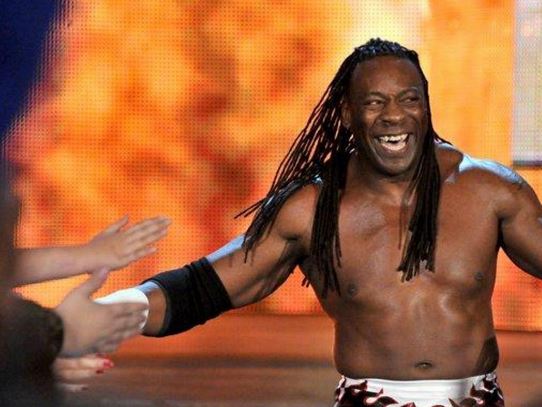
Booker T: STEEP Decline
This feud lasted all of two weeks, but it was a memorable two weeks and for the wrong reasons. The week before WrestleMania, Triple H cut a scathing promo that insulted Booker T in an almost ‘shoot-like’ way. His exact words were, “somebody like…you…doesn’t get to be World Champion. People like you don’t deserve it. That’s for people like me. You’re not here to be a competitor, you’re here to be an entertainer.”
WWE tried to justify this by claiming that Triple H was going after Booker T as a guy with a criminal past, and that ‘people like that’ don’t get to be celebrated as World Champions. But let’s not kid ourselves here. Triple H’s lines were kept intentionally vague so that people could interpret them as either Triple H going after Booker T for being an ex-con or Triple H explicitly saying that Booker T couldn’t become world champion because he was black. It was racy, scathing, personal, and according to many people, straight-up racist. It sent people into a furor, hoping that Booker would at least get his revenge at WrestleMania XIX.
Had Booker won, he would’ve been vindicated for having to deal with such scathing insults, and it would’ve made a lot of people happy since Booker was one of the most underappreciated wrestlers on the RAW roster at the time.
But that didn’t happen. Instead, Triple H became the reason that the ‘hit-your-finisher-delayed-pin’ trope doesn’t have a full 100% kickout rate. There’s a reason that storytelling device exists. The whole point is to build sympathy for the babyface, for them to have a last chance at hope. It has been a common-sense practice in wrestling for decades that whenever one wrestler lands their finisher but fails to pin immediately afterward, the person taking the pinfall kicks out.
So leave it to Triple H to Pedigree common sense to build himself up.
At WrestleMania XIX, Triple H Pedigree’d Booker T. From the time HHH landed that move to the moment the ref counted three, twenty-three seconds had passed. So not only did Triple H beat Booker T, effectively proving himself right, but he beat Booker T so badly that one single move put him down for over twenty seconds.
Sure, it got the Pedigree over as some kind of dastardly super-weapon (laughs in All Japan). But it came at the expense of yet another potential RAW main-eventer. This is the match for which smart fans online started using the word ‘burial’, even if it wasn’t entirely correct. From watching this feud and how it ended, the narrative that HHH was knocking people down instead of bringing them up to his level gained even more steam. Booker T had fought hard to get close to the mountain top and Triple H threw so many rocks at him that he fell way down until he plummeted deep beneath the earth.
It took Booker T another three years to win a World Title in WWE, but that meant much less than a potential win here for two reasons. First, Booker won his World Title as ‘King Booker’, an over-the-top royalty pretender that was not supposed to be taken seriously. Second, by that point, the World Heavyweight Championship had lost a considerable amount of prestige, to the point that it was seen as the old Intercontinental Title.
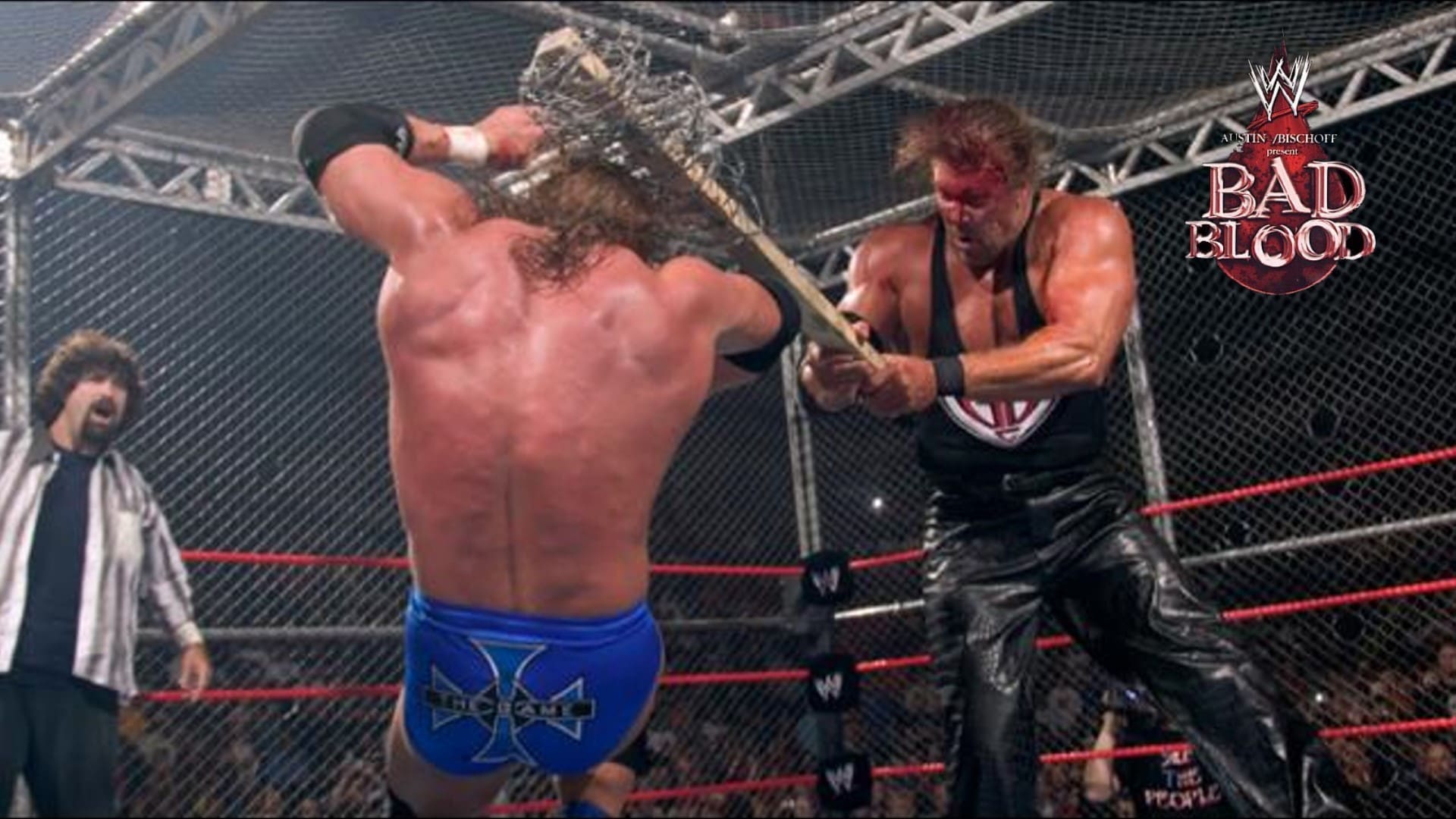
Kevin Nash: Decline
Nash was supposed to be a big deal when he debuted in WWE in 2002 as part of the NWO. But that was derailed due to Nash’s quad injury (because, of course it did), so a match between Kliq buddies didn’t take place until Judgment Day 2003.
And when it did, it SUCKED.
Nash was not in great physical shape and wasn’t wrestling ‘vanilla midgets’ anymore but someone closer to his own size. Unfortunately, there just wasn’t any good chemistry between Triple H and Nash. They had matches that were disappointing, straight-up bad, or both. This was the time that Triple H became increasingly unwatchable, with his long-winded promos and constant time on top not justifying his world title matches. Having the world title was supposed to mean you were the best/most exciting/biggest star. None of his PPV matches with Nash sold that idea. And with internet forums gaining steam, more and more people started arguing that Triple H was benefitting from backstage politics. Why was Triple H wrestling former WCW guys past their prime instead of someone new? It reeked of cronyism and made people change the channel whenever Triple H was on.
As for Nash, he was gone from WWE soon afterward, which made people question why he was given such big opportunities in the first place.
And speaking of former WCW guys…
Goldberg: Steep Decline
There’s this saying that goes ‘timing is everything’ and Goldberg’s first WWE run was a prime example of that saying in action. When he came to WWE, there was a glimmer of hope among fans. WCW’s biggest homegrown star was now in WWE and he was going to destroy people left, right, and center. Sadly, those dreams were broken when Goldberg ran afoul Triple H.
After four months of Goldberg doing what Goldberg did best, he earned a spot in the second-ever Elimination Chamber match at SummerSlam 2003. That was the perfect environment for Goldberg to do his thing: to unleash utter mayhem and run people over like a freight train. He eliminated three opponents – Randy Orton, Shawn Michaels, and Chris Jericho – in very short order. He was on fire. People were completely behind him. It was his time to dethrone Triple H and change the direction of Monday Night RAW.
Yeah, right.
With Goldberg as white-hot as he was, the logical finish would’ve been for Goldberg to mangle Triple H as he did those other three wrestlers. But that’s not what happened. Instead, Triple H used his trusty sledgehammer to pin Goldberg and retain his title. SummerSlam 2003 ended with Goldberg on his back staring at the rafters and Triple H standing over him, victorious yet again.
Goldberg did get his rematch a month later at Unforgiven 2003, and he did beat Triple H for the World Heavyweight Championship. But by that point, the damage was done. Goldberg had become just another guy beneath Triple H. He was no longer special. His megastar aura had evaporated. Even though it was a cheap loss, that SummerSlam result already proved that Goldberg was no longer someone that could be above Triple H.
It’s possible that this was a classic case of wrestling politics at play. After all, why would Triple H – a WWE guy through-and-through – allow himself to be made to look bad against Goldberg, WCW’s greatest creation from the Monday Night Wars? When framed that way, it’s pretty obvious that Triple H wouldn’t allow himself to lose to an outsider without first establishing himself as the better of the two.
But from the fans’ perspective, Triple H didn’t need the win at SummerSlam 2003. That could’ve come later. Instead, WWE ruined Goldberg to the point that he wouldn’t renew his one-year contract and then left the company for twelve years. Clearly, Goldberg hated this rivalry as much as the fans did.
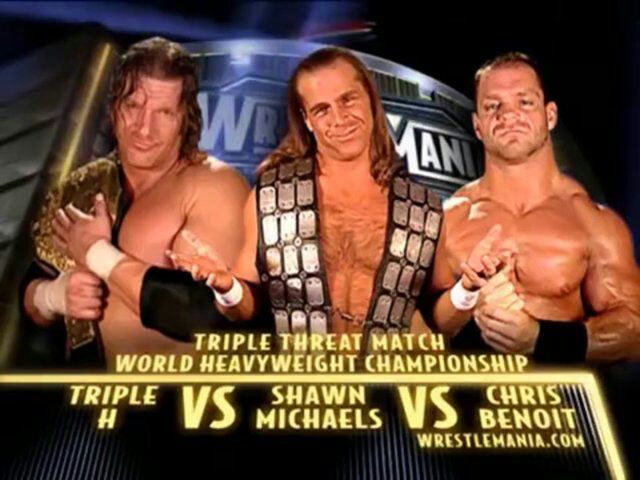
Chris Benoit: Decline
There are two kinds of title reigns in WWE: ones intended as a major push and one intended as a ‘thank you for your work’. This was a case of the latter.
Chris Benoit was never meant to be a long-term champion. The story of his career and how it led to his big win at WrestleMania XX was great. And his celebration at that event was filled with genuine emotion. But once the emotion died down and WWE moved forward, it became clear that Benoit was only meant to be a transitional champion. After all, Benoit was short, not particularly charismatic, below average on the mic, and sold himself on his incredible in-ring skills. In contrast, Triple H was much bigger, better on the mic (relatively), more marketable, had a killer finisher, possessed a WAY better physique, and knew how to really control a crowd. For all the guy’s faults, Triple H was really skilled at getting people to hate him and the few things he did know how to do in the ring he did incredibly well.
This feud is actually the exception rather than the rule. At WrestleMania XX, Triple H tapped out cleanly to Benoit’s Crippler Crossface submission move. There was no BS, no shenanigans, and no Dusty finish. Just a clean, decisive win for Benoit. A month later, Benoit beat Triple H cleanly again. HHH did everything in his power to make Benoit look like a superstar. But all of Triple H’s (and Benoit’s, for that matter) hard work for naught as Benoit wouldn’t stay in the World Title picture for long. He lost the World Title at SummerSlam to Randy Orton and was back in the midcard within a month.
For once, Triple H actually did his job well as RAW’s top heel. The only problem was that he continued his habit of cutting draining and meandering promos. At least that part didn’t really change things.
And speaking of SummerSlam…

Eugene: Steep Decline
The Eugene character was…controversial, to say the least. His character was criticized immediately and regularly as mocking people with legitimate intellectual disabilities. Apparently, that wasn’t the intent; WWE’s writers wanted him to be the pro-wrestling version of Rain Man, but things just didn’t pan out that way. It was strange; he was arguably the most sympathetic character on RAW. I mean, he was basically a man with the brain of a naïve kid being bullied and mocked by everyone around him. It was a natural storyline to make him into a lovable underdog. But those things ended when Triple H became part of the feud.
When The Rock asked Eugene who his favorite wrestler was (expecting Eugene to answer “The Rock”), Eugene loudly proclaimed ‘TRIPLE H!’ That led to a short but memorable feud that basically ended Eugene as a prominent character. Triple H was seen as being one step ahead of Eugene on several occasions, including a particularly brutal promo that saw Triple H bloody Eugene’s friend William Regal.
The logical storyline direction here would’ve been for Eugene to beat Triple H at their big upcoming PPV match. After all, Triple H was making a fool out of Eugene and hurting him both physically and emotionally. There was so much sympathy for Eugene that it stood to reason for him to get revenge in their big match.
But that didn’t happen. Instead, Triple H mopped the floor with Eugene at SummerSlam 2004, even though he didn’t really need the win here and a victory for Eugene would’ve been more interesting. Their match went way too long, especially since the Eugene character had started to blur the lines between being a serious take on people with disabilities and a comedy character. It also didn’t help that the Toronto fans turned on Eugene completely. My people can be weird sometimes.
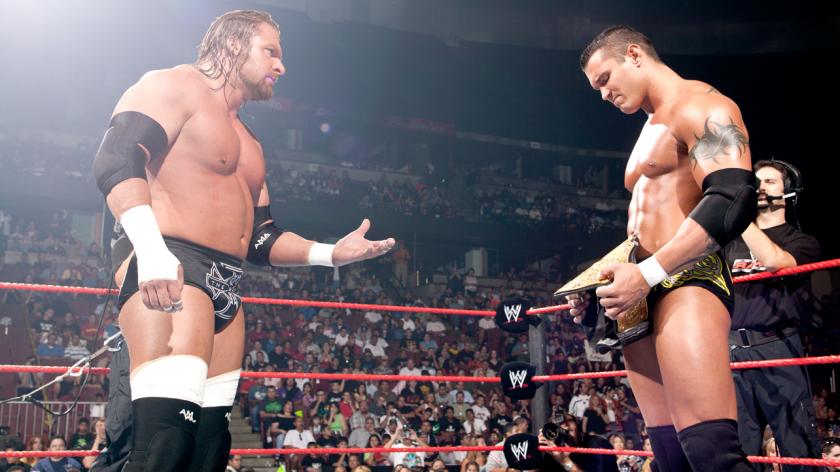
Randy Orton: Incline
Randy Orton became the youngest world champion in WWE history by beating Chris Benoit. It was a shocking move, but a necessary one. WWE needed to create new stars and this was certainly a good way to do so. But that drive to create new stars only made Orton’s next big PPV match even more perplexing.
After turning on Orton in the most violent way possible, Triple H beat Orton for the title at Unforgiven, ending Orton’s reign after only a month. On one hand, it didn’t make much sense to cut Orton’s legs out from under him, especially since he was such a sympathetic character at the time. He had just been betrayed by Evolution and needed to survive on his own. There was a ready-made storyline there for him to try and defend his newly-won World Ttle against each member of Evolution one by one, culminating with Triple H. That would’ve done wonders to elevate him as a credible star, similar to how Benoit was elevated by beating both Triple H and Shawn Michaels in quick succession.
But unlike Benoit, Orton stayed at that top-level; it just took him a while to get there. Maybe he was one of those wrestlers better suited at chasing the title rather than defending it. Or maybe he was better at being an obnoxious heel than a sympathetic underdog. Either way, Orton did actually leave his feud with Triple H better than how he entered it. He lost his title, sure, but he also got the upper hand on HHH several times and angered him to the point that he had to go the extra mile to beat Orton. So while Orton might not have seen a major incline after wrestling Triple H, the seeds of a gradual push had been planted.
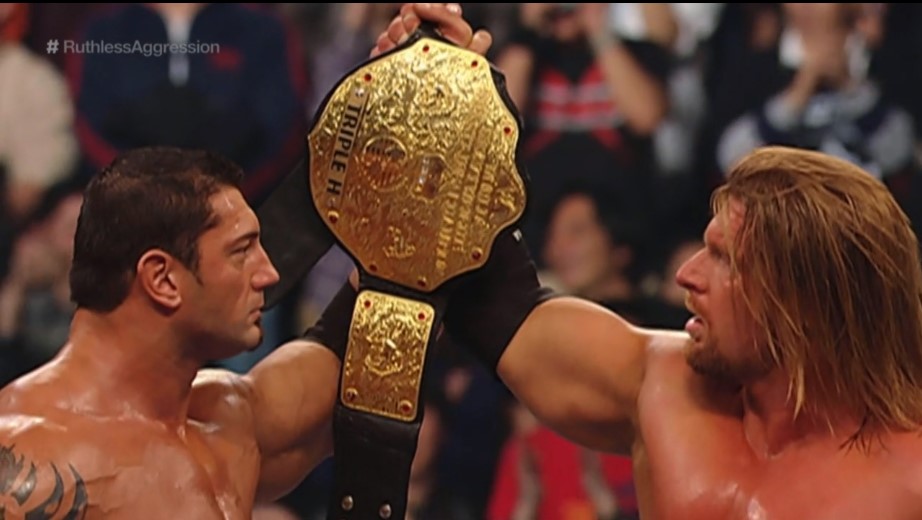
Batista: Steep Incline
Few wrestlers have been able to manhandle Triple H like Batista. After winning the 2005 Royal Rumble, Batista turned on Triple H in the same way that Triple H had turned on Orton. But unlike Orton, Batista was able to beat Triple H not once, not twice, but thrice. He beat Triple H in the main event of WrestleMania 21, then again at Backlash, and then again at Vengeance. And that third match was inside Hell in a Cell, a match that was supposedly Triple H’s specialty. Batista became the first person to ever beat Triple H in the Cell, and cemented himself as far more than just the new flavor of the month that happened to be wearing the belt. Batista became a bona fide star and would go on to become a top star in WWE for the next five years. Triple H lost decisively in each one, and actually had pretty solid matches with Batista. They were far better than most people expected them to be, which shows just how committed he was to have a good match while also making Batista look as good as possible.
BONUS: The Intercontinental Championship: STEEP Decline
Triple H killed the Intercontinental Championship in 2002, there are no two ways about it. When he beat Kane at No Mercy 2002, he became both World Heavyweight and Intercontinental Champion. Thus, a title with a lineage stretching all the way back to 1979 was unified with a belt that had been handed to Triple H two months earlier. It was one of those moments that just screamed ‘well this guy’s just doing this to make himself look better for no good reason’. It was blatantly obvious that the IC belt meant nothing anymore; it had gone from being a championship that symbolized a wrestler’s talent to being a shiny prop for one to wear just because it looked pretty.
WWE did eventually reinstate the IC belt, but it was a shadow of its former self. The IC belt has since become a title that no one cares about. Even Vince McMahon himself has said as such:
Analysis
Looking back on it now, there are two aspects of the Reign of Terror that we can draw attention to: the one that Triple H controlled completely and the one that he didn’t. The one that he didn’t was WWE’s creative direction at the time. Yes, it was pretty much an open secret that HHH was involved in creative meetings at the time and voiced his opinions on different topics. But he didn’t always get his way or have the final say. For example, most accounts seem to indicate that he was overwhelmingly opposed to the Katie Vick storyline, but sucked it up and went with it because Vince McMahon wanted it. He was also believed to be opposed to RVD being directly punished for the botch in the Elimination Chamber, which some people were said to have supported.
Triple H might’ve controlled who he fought and how his matches went to some degree. But no one can say for sure that he politicked his way through every big decision. We can only speculate on that, nothing more.
But then there was the other thing: the way Triple H fought and booked his matches. This is something he directly controlled and he failed to deliver more often than not. At the end of the day, all the stories, angles, drama, feuds, rivalries, and gimmicks are meant to sell tickets and PPV buys. Wrestling fans tuned into WWE to see their favorite wrestlers fight and wanted to be rewarded – or at least satisfied – with their emotional and time investments. And Triple H’s matches didn’t give them what they wanted. More often than not, Triple H wrestled boring matches that ended with a cheap finish. If you were to make a drinking game out of Triple H’s matches back then and take a shot each time one of his typical tropes came up (ref bump, interference, sledgehammer shot, DQ ending, 20-minute promo running everyone down), you’d die of alcohol poisoning.
Compare this to what was happening around him. While Triple H was having below-average matches that featured shenanigans and controversy, SmackDown showcased awesome wrestling matches on a regular basis. Guys like Brock Lesnar and the SmackDown Six (Kurt Angle, Edge, Rey Mysterio, Chris Benoit, Eddie Guerrero & Chavo Guerrero) were putting on tremendous performances. Even The Undertaker seemed to have better matches on average once he went to SmackDown. Fans saw what was happening on SmackDown and felt like each show was worth the money. Those same fans saw Triple H talk forever on RAW and under-deliver on PPVs and felt like they were getting ripped off with him being the centerpiece of RAW all the time.
The Verdict
Using the above results, let’s see how many wrestlers benefitted and how many didn’t:
Steep Incline: 2
Incline: 1
Decline: 4 (not including Hollywood Hogan and Chris Benoit, whose declines weren’t directly caused by Triple H.)
Steep Decline: 7 (including the Intercontinental Title)
From these results, we can conclude that only two wrestlers saw a major upward shift in their careers. One got this because he was an established WWE guy that was making a dream comeback, and the other one was because he was in Triple H’s stable Evolution. The only other wrestler to benefit saw a gradual growth in his career, but it wasn’t a steep incline because he needed to develop more as a character. In simpler terms, the three wrestlers to benefit from wrestling Triple H in high-profile feuds were those that were in his inner circle for lengthy periods.
As for the 11 remaining wrestlers, all of them saw their careers falter, some far more so than others. Three of the worst affected were ex-WCW guys, and the one that suffered the worst was Kane, one of the most beloved and admired wrestlers in WWE history.
So simply put, yes, the Reign of Terror earned its name. It really was that bad.
If you have any thoughts or feedback, you can email me here. Thanks for reading.
